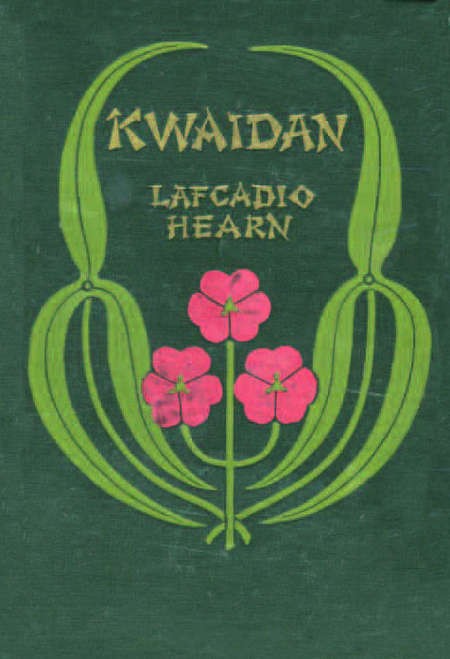Kwaidan (1st edition)
Author: Lafcadio Hearn
When Published: 1904
Publisher: Houghton, Mifflin & Co.
Available: Ist edition long since sold out. New editions are available. Also available second hand.
Description: Hard cover

The best work among his works which belong to the genre of retold tales. He rewrote Japanese traditional grotesque tales narrated by his wife, Setsu, in English, having infused literary spirits in them. Hearn wrote this book to persuade the universal truth which he believed is the mental base for human beings to live on. The book has been translated into many languages.
- Takis Efstathiou
Details about a movie based on the book.
Kwaidan - Japanese Horror Film Review
Director Masaki Kobayashi Brings Japanese Folktales To Life
Oct 18, 2009
Jeremy Suizo
Kwaidan is a subtle take on four traditional Japanese ghost stories; no gore no twists, but beautifully haunting. Kwaidan (1964), meaning "ghost stories", is based on a collection of Japanese folk tales compiled by Lafcadio Hearn during the early 1900s. The film retells four such ghost stories.
The Film Segments
•The Black Hair (Kurokami) - A poor samurai divorces his wife and remarries for money and social status, only to find that his new marriage is more trouble than its worth. He returns to his old wife, their house now rundown and full of weeds, but soon discovers that his wife isn't quite the same anymore.
•The Woman of the Snow (Yuki-Onna) - Two woodcutters become stranded in a hut during a terrible snowstorm. After they fall asleep, the younger awakens to find his companion frozen solid and a spirit standing over him in the form of a woman with pale white skin. The spirit spares the younger woodcutter's life under the condition that he never tells anyone about the encounter. Years later, married and with children, he reveals his secret.
•Hoichi, the Earless - (Miminashi Hoichi no Hanashi) - Hoichi is blind musician who is particularly gifted in singing the ballad about Dan-no-ura, a decisive naval battle that marked the fall of a Taira clan. Shortly after taking residence at a temple near the site of the battle, Hoichi is visited by the ghosts of the Taira clan, wishing for him to play for them. When the priests discover what is happening, they take measures to ward off the ghosts, but forget an important detail.
•In a Cup of Tea (Chawan no Naka) - A writer retells the unfinished story of a samurai who is haunted by the spirit of a man whose reflection mysteriously appeared in a cup of tea he drank.
Kwaidan - Film Style
Kwaidan doesn't use shock value or gore to induce scares. In fact, the film may not be what some consider scaring at all, but what Kobayashi does wonderfully is to create a steady buildup of tension and suspense within each of the segments. The pacing can be a bit slow, especially for a film that spans nearly three hours long, but Kobayashi's direction of the film draws the audience into the space and time of the folktale.
Kwaidan is a film that stands calmly and confidently and lets the ghost stories speak for themselves, leaving a haunting feeling associated with old fashioned storytelling.
Read more at http://jeremy-suizo.suite101.com/